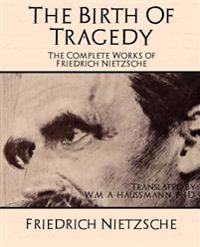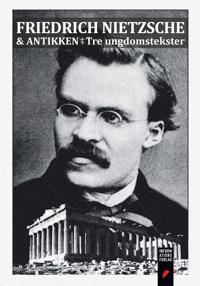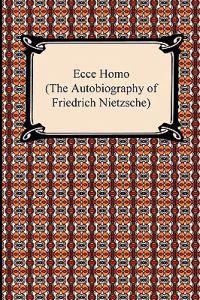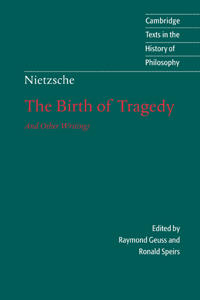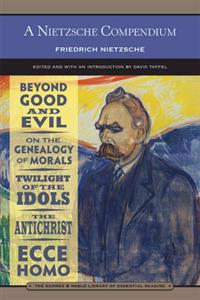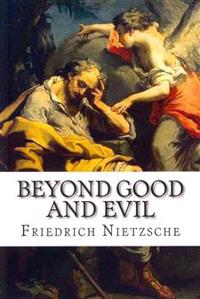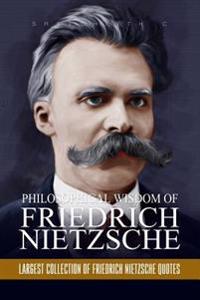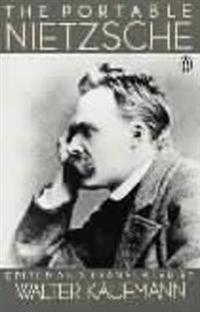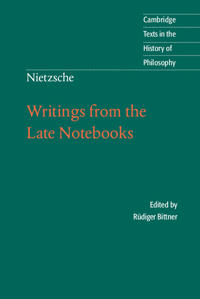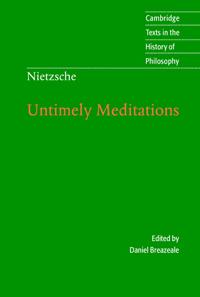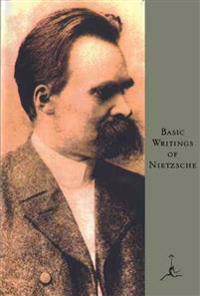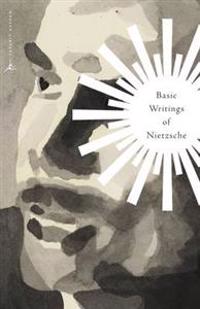The Complete Works of Friedrich Nietzsche (Häftad)
avNietzsche Friedrich Nietzsche, Friedrich Nietzsche
ISBN: 9781594625855 - UTGIVEN: 2007-04Friedrich Nietzsche & antikken (Häftad)
avFriedrich Nietzsche
ISBN: 9788775143580 - UTGIVEN: 2012Grækenland i det sjette og femte århundrede f.Kr. var både forbillede og udgangspunkt for Friedrich Nietzsches filosofi. Som så mange andre tænkere før ham, og nogle få efter, så han denne periode som en fuldkommen uforlignelig guldalder. Et højdepunkt i menneskets histori[...]
Ecce Homo (the Autobiography of Friedrich Nietzsche) (Häftad)
avFriedrich Wilhelm Nietzsche
ISBN: 9781420932263 - UTGIVEN: 200901Selected Letters of Friedrich Nietzsche (Häftad)
avFriedrich Wilhelm Nietzsche, Oscar Levy
ISBN: 9781503148468 - UTGIVEN: 2014-11The Selected Writings of Friedrich Nietzsche (Inbunden)
avMencken, H. L., Nietzsche, Friedrich Wilhelm
ISBN: 9781604593334Collected here in this omnibus edition are three of Nietzsche's three most important books: The Anti-Christ, Beyond Good and Evil, and Thus Spake Zarathustra, as well as The Philosophy of Friedrich Nietzsche by Henry Louis Mencken. A perfect book for new readers of Nietzsche or anyone hoping to unde[...]
Friedrich Nietzsche: Asi Hablo Zaratustra / El Ocaso de Los Idolos / Mas Alla del Bien y del Mal / El Anticristo (Inbunden)
avFriedrich Wilhelm Nietzsche
ISBN: 9788497941402 - UTGIVEN: 2013-10Nietzsche: The Birth of Tragedy and Other Writings (Inbunden)
avFriedrich Nietzsche
ISBN: 9780521630160 - UTGIVEN: 1999-04The Birth of Tragedy is one of the seminal philosophical works of the modern period. Nietzsche's discussion of the nature of culture, of the conditions under which it can flourish and of those under which it will decline, his analysis of the sources of discontent with the modern world, his criticism[...]
A Nietzsche Compendium (Häftad)
avFriedrich Nietzsche
ISBN: 9780760791103 - UTGIVEN: 2014-07This convenient new compendium contains the five most philosophically significant of Nietzsche's post - "Thus Spoke Zarathustra" writings. Nietzsche wrote of these works that he intended them as 'fish hooks' for catching readers who shared his sense that a cataclysmic shift in human psychology had s[...]
The Case Of Wagner Nietzsche Contra Wagner and Selected Aphorisms - The Original Classic Edition (Häftad)
avFriedrich Nietzsche
ISBN: 9781486152735 - UTGIVEN: 201206Beyond Good and Evil (Pocket)
avFriedrich Nietzsche, Helen Zimmern, Friedrich Nietzsche
ISBN: 9781506183190 - UTGIVEN: 2015-01Philosophical Wisdom of Friedrich Nietzsche: Largest Collection of Friedrich Nietzsche Quotes (häftad)
ISBN: 9781537788432 - UTGIVEN: 2016-09The Life of Friedrich Nietzsche: Friedrich Nietzsche (häftad)
ISBN: 9781979537872 - UTGIVEN: 2017-11The Life of Friedrich NietzscheBy Daniel HalevyTranslated by j. M. MoneWith an Introduction By T. M. KettleThe duel between Nietzsche and civilisation is long since over; and that high poet and calamitous philosopher is now to be judged as he appears in the serene atmosphere of history, which--need [...]
The Portable Nietzsche (Storpocket)
avFriedrich Wilhelm Nietzsche, Walter Arnold Kaufmann
ISBN: 9780140150629 - UTGIVEN: 199412The works of Friedrich Nietzsche have fascinated readers around the world ever since the publication of his first book more than a hundred years ago. As Walter Kaufmann, one of the world's leading authorities on Nietzsche, notes in his introduction, "Few writers in any age were so full of ideas", an[...]
Nietzsche: Writings from the Late Notebooks (Häftad)
avFriedrich Wilhelm Nietzsche
ISBN: 9780521008877 - UTGIVEN: 200302For much of his adult life, Nietzsche wrote notes on philosophical subjects in small notebooks that he carried around with him. After his breakdown and subsequent death, his sister supervised the publication of some of these notes under the title The Will to Power, and that collection, which is text[...]
Nietzsche: Untimely Meditations (Häftad)
avFriedrich Wilhelm Nietzsche
ISBN: 9780521585842 - UTGIVEN: 199711The four short works in Untimely Meditations were published by Nietzsche between 1873 and 1876.They deal with such broad topics as the relationship between popular and genuine culture, strategies for cultural reform, the task of philosophy, the nature of education, and the relationship between art, [...]
Nietzsche (Pocket)
avFriedrich Wilhelm Nietzsche, Maudemarie Clark, Brian Leiter
ISBN: 9780521599634 - UTGIVEN: 1997-11Daybreak marks the arrival of Nietzsche?s ?mature? philosophy and is indispensable for an understanding of his critique of morality and ?revaluation of all values?. This volume presents the distinguished translation by R. J. Hollingdale, with a new introduction that argues for a dramatic change in N[...]
Nietzsche (Pocket)
avAdrian Del (EDT) Caro, Robert B. (EDT) Pippin, Friedrich Wilhelm Nietzsche
ISBN: 9780521602617 - UTGIVEN: 2006-07Nietzsche regarded 'Thus Spoke Zarathustra' as his most important work, and his story of the wandering Zarathustra has had enormous influence on subsequent culture. Nietzsche uses a mixture of homilies, parables, epigrams and dreams to introduce some of his most striking doctrines, including the Ove[...]
Nietzsche, The Gay Science (Inbunden)
avFriedrich Wilhelm Nietzsche
ISBN: 9780521631594 - UTGIVEN: 2001-08Nietzsche wrote The Gay Science, which he later described as ?perhaps my most personal book?, when he was at the height of his intellectual powers, and the reader will find in it an extensive and sophisticated treatment of the philosophical themes and views which were most central to Nietzsche?s own[...]
Nietzsche: The Gay Science (Pocket)
avFriedrich Wilhelm Nietzsche
ISBN: 9780521636452 - UTGIVEN: 2001-08-23A new translation and edition of this important and influential statement of Nietzsche's philosophy.
Nietzsche: The Birth of Tragedy and Other Writings (Häftad)
avFriedrich Wilhelm Nietzsche
ISBN: 9780521639873 - UTGIVEN: 1999-04The Birth of Tragedy is one of the seminal philosophical works of the modern period. Nietzsche?s discussion of the nature of culture, of the conditions under which it can flourish and of those under which it will decline, his analysis of the sources of discontent with the modern world, his criticism[...]
Basic Writings of Nietzsche (Inbunden)
avFriedrich Wilhelm Nietzsche
ISBN: 9780679600008 - UTGIVEN: 199407Introduction by Peter Gay
Translated and edited by Walter Kaufmann
Commentary by Martin Heidegger, Albert Camus, and Gilles Deleuze
One hundred years after his death, Friedrich Nietzsche remains the most influential philosopher of the modern era. "Basic Writings of Nietzsche" gathers the [...]The Basic Writings of Nietzsche (Häftad)
avFriedrich Wilhelm Nietzsche
ISBN: 9780679783398 - UTGIVEN: 200101Introduction by Peter Gay
Translated and edited by Walter Kaufmann
Commentary by Martin Heidegger, Albert Camus, and Gilles Deleuze
One hundred years after his death, Friedrich Nietzsche remains the most influential philosopher of the modern era. "Basic Writings of Nietzsche" gathers the [...]The Case of Wagner, Nietzsche Contra Wagner, and Selected Aphorisms (Dodo Press) (Häftad)
avFriedrich Wilhelm Nietzsche
ISBN: 9781406599404 - UTGIVEN: 2008-10Friedrich Nietzsche on Wagner - The Case of Wagner, Nietzsche Contra Wagner, Selected Aphorisms (häftad)
ISBN: 9781612039695 - UTGIVEN: 2012-02Beyond Good and Evil (Inbunden)
avFriedrich Nietzsche
ISBN: 9780141395838 - UTGIVEN: 2014-101. The Will to Truth, which is to tempt us to many a hazardous enterprise, the famous Truthfulness of which all philosophers have hitherto spoken with respect, what questions has this Will to Truth not laid before us! What strange, perplexing, questionable questions! It is already a long story; yet [...]

